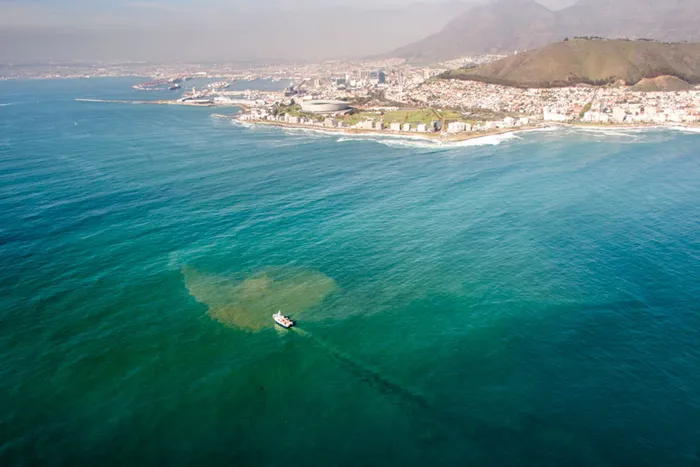Minister pulls chain on City’s poo permits

Marine conservation photographer Jean Tresfon took this picture in May 2015 of what he says is a sewage plume from the Green Point outfall.
A national minister’s decision to pull the permits that let the City pump raw sewage into the Atlantic has been welcomed by environmentalists, with one saying the Hammanskraal cholera outbreak, which left more than 20 dead, carries stark lessons for political appointees tasked with waste disposal.
Forestry, Fisheries and the Environment Minister Barbara Creecy announced on Tuesday June 13 that she had reversed her decision to grant the permits, saying the City's public participation process was “inadequate, outdated and should be redone”.
The permits allow the City to pump raw sewage from three coastal outfalls at Camps Bay, Hout Bay and Green Point. The permit for Hout Bay was issued in 2019 while the permits for Green Point and Camps Bay followed in 2022.
The Atlantic Sun has reported repeatedly on the pollution issue (“Camps Bay marine outfall causes a stink,” February 11, 2022; “Sewage matters under spotlight, March 16, 2023; “Experts question Blue Flag water testing,” June 1, 2023; “Report to outline options for sewage treatment,” June 15, 2023).
The National Sea Rescue Institute (NSRI), ActionSA, CapeXit (Cape Independence Party), and activists Stefan Smit and Tracy Satt had appealed against Ms Creecy’s original decision earlier this year to issue further five-year permits to the City.
ActionSA provincial chairperson, Michelle Wasserman said the appeal had argued that the permits were based on “factually incorrect information; contravened the Marine Living Resources Act; contravened the Bill of Rights including the right to a healthy environment, and there was no evidence that a public participation process or risk assessment was conducted.”
Ms Wasserman said 39 million litres of raw sewage were being pumped into or adjacent to the Table Mountain National Park Marine Protected Area from the three coastal suburbs every day.
Dr Tony Turton, an environmental specialist at the University of Free State, said the authorities were “tone deaf” to the growing risk associated with what he called “our national sewage crisis”.
Business as usual was no longer an option, whether the sewage went into rivers or the ocean, he said, adding that the growing public awareness could place political appointees at risk of criminal prosecution, as was being seen with the Hammanskraal cholera outbreak.
“We are at a pivotal moment where the way we manage waste will be linked to human health and economic prosperity,” said Dr Turton.
Sentinel Ocean Alliance managing director Marguerite Hofmeyr said Minister Creecy's decision “reflects a commitment to transparency, accountability, and the protection of our marine ecosystems and acknowledgement that the previous process was inadequate and outdated. The health of our oceans is essential for the well-being of both marine life and human communities.”
Among other things, the City has been ordered to give notice about a new public participation process in the Government Gazette and one local newspaper widely distributed, also to give notice in one national newspaper and advertise it in three languages.
Following the decision, mayoral committee member for water and sanitation Zahid Badroodien said in a media statement that the City had applied for the permits in 2015 after a public participation process had taken place.
“Because the minister is only deciding the appeal eight years after public participation was conducted, the minister has determined that the City should collate fresh public inputs to enable her to decide the merits of the appeal. The City welcomes the opportunity to do this and has already briefed consultants to undertake the public comment process.”
Dr Badroodien said seven major studies had been done by different marine science experts since the initial public participation.
“These studies included bacterial samples, toxicity samples, mussel growth monitoring, animal tissue samples, preliminary biodiversity surveys, chemicals of emerging concern studies, dissolved oxygen and detailed numerical modelling.”
An expert summary report on that research, he said, concluded that “the marine outfalls are meeting their design objectives in reducing potential deleterious ecological and/or human health effects of discharged effluent by taking advantage of increased effluent dilution offered by deep water”.
The City, he added, had further commissioned a study that would determine the feasibility and costing of various higher level pre-treatment interventions at the outfalls.
“The draft scoping report for this study is anticipated to be complete by 30 June 2023. Further community engagements are planned for later this year on the way forward regarding outfalls once the City has had an opportunity to consider the outcome of the study.”
In the interim, the City would announce the logistics for public engagement regarding the discharge permits in due course.

